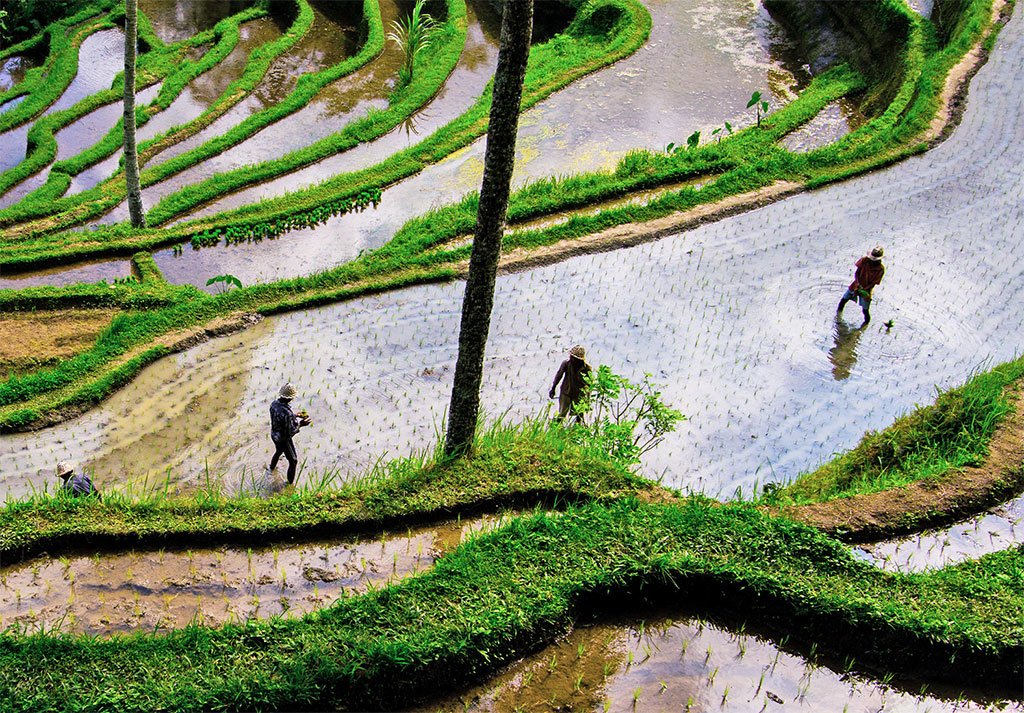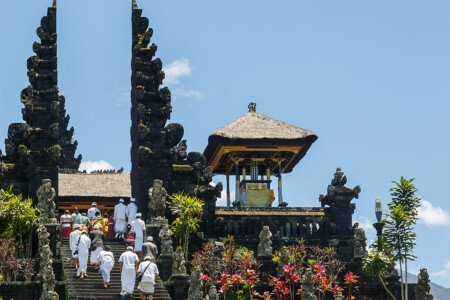Bali’s cultural heart beats strongest in Ubud. Once a quiet village of artists and rice terraces, Ubud has blossomed into a hub of creativity, spirituality, and soulful adventures. But beyond the mainstream, new ways are emerging to experience its timeless essence. Here are six transformative experiences—reimagined, refreshing, and deeply connected—that reveal Bali’s soul in unexpected ways.
1. 🧘♀️ Subak Stories and Rice Field Rituals
From Terraces to Traditions
Ubud’s iconic rice terraces are more than picturesque landscapes—they’re living cookbooks of Balinese heritage known as subak, the traditional irrigation system recognized by UNESCO. While tourists often linger for photos, the real magic happens behind the scenes: in the daily rituals of farmers, priests, and water guardians.
Invitation-Only Subak Walks
Commit to a guided morning walk with a local pekaseh (subak head). These intimate treks unfold before the sun fully rises, as farmers chant blessings, pump water through canals by hand, and set offerings on the bunds. Witnessing an odalan (temple cleansing ceremony) at a canal shrine is a spiritual experience rarely open to casual visitors.
Hands-On Community Workshops
After the walk, enjoy a communal lunch prepared with seasonal produce from subak fields. Then, attend a hands-on workshop: plant rice seedlings, build offering baskets alongside local women, and learn the Bali Aga worldview—where rice, water, and spiritual balance are one. You’ll leave with more than memories: you’ll carry a newfound reverence for the land and its timeless caretakers.
2. 🎨 Neo-Keris: The Modern Art of the Sacred Dagger
Why the Keris Matters
The keris is far more than a weapon—it’s a spiritual object, an heirloom, and an art form. Traditional keris-making is a ritual steeped in mysticism. Today, a new wave of artisans and spiritual practitioners are redefining keris-making as a living art that bridges ancient rites and contemporary expression.
Studio Visit with a Neo-Keris Artisan
Begin with a guided visit to a secluded artisan’s studio, where the rhythmic hammering of molten metal reverberates off volcanic stone. Learn how percussion, chants, and meditation guide the forging process. Beyond metalwork, the reflections of village elders, local healers, or pemangku (temple priests) are invited, infusing each keris with ancestral intent.
Create Your Own Spirit Blade
In select workshops, under expert guidance, you can shape a miniature keris or a symbolic dagger charm—cooled with herbal bath and blessed in an intimate ceremony. This creative, hands-on process becomes deeply personal: as you forge metal, you reflect on inner strength, protection, and spiritual intention.
3. 🌕 Moonlight Temple Time Travel & Dance
Temple Visits at Night
Ubud’s famed temples—like Pura Dalem, Pura Gunung Lebah, and Goa Gajah—are typically visited in daylight. Yet, exploring them at night under the moon’s glow transforms the experience entirely. Shadows ripple, stone carvings take on new life, and the spiritual energy feels palpable.
Nocturnal Ritual Reenactments
Some cultural collectives organize reimagined nightly rituals at off-the-beaten-path temples. These are not tourist shows, but carefully researched reenactments of puberty ceremonies (metatah), healing blessings, or fertility rites performed under moonlight. The community opens specific temple zones and invites participants to witness or even join small roles. With incense smoke drifting around ancient stones, these ceremonies evoke ancestral timelines.
Intimate Moonlit Dance Performances
After the ritual, enjoy a small-scale moonlight dance performance—an intimate variant of Legong, Barong, or Gambuh—in an open-air temple courtyard. Performers wear traditional costumes, but the setting and scale create a personal, immersive experience with the eclipsed moon and the distant crow-rustle of night insects as your audience.
4. 🎶 SoundBath Selaras: Healing with Indigenous Instruments
The Science of Balinese Sound
Rice pounding stones, temple gongs, bamboo flutes—the ambient sounds of Bali are intrinsically rhythmic and harmonious. Modern sound-healing practitioners in Ubud are blending these indigenous sounds into therapeutic SoundBath sessions called Selaras, meaning “harmony,” designed to restore physical, emotional, and energetic balance.
Immersive Sound-Healing Sessions
Led by a duo—a Balinese musician and a Western-trained sound therapist—you recline amidst gongs, jegeg gong (tenun weaving boards), bamboo crypto-flutes, and chimes, all tuned to natural frequencies. Candlelit rice field edges or traditional bale provide the space, while skilled breath guidance and meditation weave through 60–90 minutes of sound intoxication.
Integrative Herbal Tea & Reflection
Afterward, enjoy a herbal tea made from locally foraged plants—temu lawak, pandan, lemongrass—while reflecting in journaling time that helps integrate the experience. Facilitators share balm balur (herbal massage) rituals if desired. People often report clarity, open-heartedness, and a profound sense of sekala–niskala (seen–unseen dimensions aligning).
5. 🚲 “Cycles & Ceremonies”: A Villager Day Adventure
Cycling Through Everyday Life
Beyond terraces and temples, Southeast Ubud’s back roads are mostly farmland, villages, and hidden streams. Organized small-group “Cycle & Ceremony” day trips invite you to immerse yourself in genuine Balinese village life—without the performance-style feel.
Market to Village, Pond to School
Depart at dawn, with a guide who’s both experienced cyclist and a former teacher. Cycle through morning markets, passing by early-morning offerings. Stop to pick jasmine flowers for an upcoming ceremony. Visit a village pond where local kids learn water sports and fishing the traditional way. Join them in feeding fish or casting small nets—you’re playing neighbor, not touring spectacle.
Participate in a Real Local Ceremony
Arrive at a nearby banjar (village council) gathering, where you’re invited to participate: share flowers at a palace shrine, help distribute ceremonial rice cakes to elders, or offer your own small symbolic gift. Afterwards, enjoy a home-cooked lunch in a family compound, sampling dishes like lawar, tumis vegetables, and bebek betutu.
6. 📚 StoryPilgrimage: Meeting Bali’s Keepers of Memory
The Need for Oral Memory
Modern Bali is quick to commercialize tourism, but Ubud’s elders—storytellers, ritualists, puppeteers—are the true keepers of Balinese identity. Their memory banks contain legends, personal histories, songs, and nuanced philosophies. A StoryPilgrimage is a curated meeting with them.
Two-Pronged Storytelling Walk
Start with a visit to a gendér wayang master outside Ubud—a shadow-puppet musician and traditional voice actor whose hands dance across bronze keys and leather puppets wayang kulit. Over rice-field tea, he shares not only Mahabharata scenes but also how stories reflect current environmental and social challenges.
Then, meet a balian tua (traditional healer) woman in the village. She recounts her mediation with ancestral spirits, recipes for herbal cures, and family lineage that traces back centuries. You ask questions, record ethically, and listen for how her voice embodies cultural continuity.
Collective Evening Gathering
The day ends with an evening community gathering in a village bale. Performances are spontaneous—sometimes a young boy’s flute, an older woman’s ritual song, a family dance. You might be asked to share your reflections. This isn’t staged for tourists; it’s a nightly ritual of continued inheritance—and you’re genuinely invited.
🕯️ Deepening Ubud Connections: Practical Tips
a) Choose Small, Authentic Experiences
Big shows and group tours have their moments—but these six experiences prioritize intimacy, respect, and depth. They’re designed for people who care about cultural integrity.
b) Mindful Dress and Etiquette
Bring your own temple attire: a kamen (sarong), sash, vestibular scarf, and a light outer top. Respect dress codes and follow local customs (e.g., women avoiding temple ceremonies during menstruation in Ubud tradition).
c) Leave No Trace, Give With Intention
Bring reusable water bottles, biodegradable bags, and ask your guide how to give meaningful tips or offerings without disrupting local balance.
d) Support the Community
Many of these experiences are offered cooperatively—honor sustainability with fair compensation. Ask your guide how your support flows back to the community.
e) Combine With Quiet Recharge
After an emotional SoundBath or ceremony day, schedule a solo day of rest—maybe by a waterfall, a silent morning walk, or journaling at one of Ubud’s meditation retreats.
🌱 Why These 6 Redefine Ubud’s Soul
Each of these experiences is an invitation:
- Subak Stories teach you to walk with the land, not above it.
- Neo-Keris forging connects creativity with ancestral lineage.
- Moonlight Temple Circles remind you rituals are lived, not just watched.
- SoundBaths attune your body to the vibrations of Ubud.
- Villager Cycling recodes travel as participation.
- StoryPilgrimages ground you in oral memory, reminding that culture lives in people.
This is Ubud reimagined—not flashy or overwrought, but profoundly alive.
📌 Final Reflections
Rediscovering Bali’s soul in Ubud means choosing patience over spectacle, presence over documentation. It means honoring people more than places, and lineages more than tourism lines. A day spent listening to elders, weaving offering baskets, or feeling gong vibrations beneath your ribs will resound far longer than a staged show or polished market visit.
Ubud remains a gateway—to spirit, to creativity, to belonging—if you enter with curiosity, humility, and intention. These six reimagined experiences invite you into an Ubud that transcends Instagram filters, offering instead a living, breathing cultural tapestry. Go with open senses, ask thoughtful questions, sit with silence, and you’ll leave with something timeless: a felt belonging.










Join The Discussion